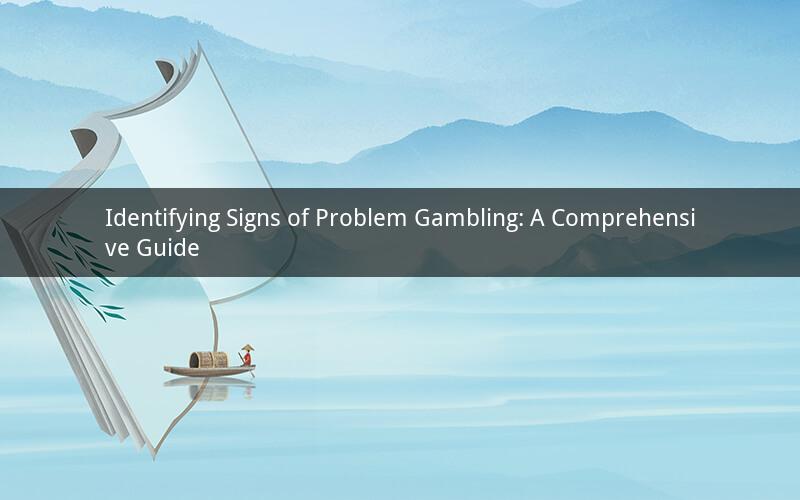
Introduction:
Problem gambling is a serious issue that can have devastating consequences for individuals and their families. Recognizing the signs of problem gambling is crucial in providing support and intervention to those in need. In this article, we will explore various indicators that may suggest someone is engaging in gambling activities that have become problematic.
1. Unusual Changes in Behavior:
One of the most apparent signs of problem gambling is a noticeable change in behavior. Here are some specific indicators to look out for:
a. Increased time spent on gambling activities: If someone is frequently preoccupied with thoughts of gambling, spending excessive time online or visiting casinos, it may indicate a potential problem.
b. Neglecting responsibilities: Problem gamblers often neglect their duties at work, school, or home due to their gambling addiction. Look out for missed deadlines, decreased productivity, or failing grades.
c. Secretive behavior: If someone is secretive about their gambling activities, hiding their spending or lying about their whereabouts, it could be a red flag.
2. Financial Struggles:
Financial difficulties are a common consequence of problem gambling. Here are some financial indicators to consider:
a. Unexplained debts: If someone suddenly has unexplained debts or credit card bills, it could be a sign that they are using gambling as a means to fund their addiction.
b. Borrowing money: Problem gamblers often turn to friends, family, or financial institutions for loans to sustain their gambling habits.
c. Selling personal belongings: In some cases, individuals may resort to selling valuable possessions to fund their gambling addiction.
3. Emotional and Psychological Changes:
Problem gambling can have a significant impact on an individual's emotional and psychological well-being. Look out for the following signs:
a. Increased irritability or mood swings: Problem gamblers may experience heightened irritability, mood swings, or aggression due to the stress and anxiety associated with their addiction.
b. Withdrawal from social activities: Problem gamblers may withdraw from family and friends, feeling embarrassed or ashamed about their gambling habits.
c. Depression or anxiety: Problem gambling can lead to feelings of depression, anxiety, or despair, as individuals struggle with the consequences of their addiction.
4. Physical Health Issues:
Gambling addiction can also have adverse effects on an individual's physical health. Here are some physical indicators to consider:
a. Sleep disturbances: Problem gamblers may experience insomnia or disrupted sleep patterns due to stress and anxiety related to their addiction.
b. Loss of appetite: Problem gamblers may experience changes in appetite, leading to weight loss or gain.
c. Increased stress: The stress associated with problem gambling can lead to increased blood pressure, headaches, or other stress-related health issues.
5. Legal and Social Consequences:
Problem gambling can lead to legal and social repercussions. Look out for the following signs:
a. Legal issues: Problem gamblers may face legal troubles due to illegal activities related to their addiction, such as theft or fraud.
b. Relationship problems: Problem gambling can strain relationships, leading to arguments, separation, or divorce.
c. Loss of employment: Problem gamblers may lose their jobs due to poor performance, absences, or other consequences of their addiction.
Conclusion:
Identifying the signs of problem gambling is crucial in providing support and intervention to those in need. By recognizing the changes in behavior, financial struggles, emotional and psychological issues, physical health, and legal and social consequences, individuals can seek help and take steps towards recovery.
Questions and Answers:
1. Q: How can I approach someone I suspect is struggling with problem gambling?
A: Approach the individual with empathy and understanding. Express your concerns and offer support without judgment or criticism. Encourage them to seek professional help.
2. Q: Can problem gambling be treated?
A: Yes, problem gambling can be treated. Treatment options include therapy, support groups, and self-help resources. It is essential to seek professional help to address the underlying issues and develop healthy coping mechanisms.
3. Q: Are there any warning signs in children or teenagers that may indicate problem gambling?
A: Yes, children and teenagers may exhibit signs such as secretive behavior, increased time spent online, or changes in grades. It is important to monitor their activities and address any concerns promptly.
4. Q: Can problem gambling lead to addiction?
A: Yes, problem gambling can progress into a full-blown addiction. If left untreated, it can have severe consequences for the individual's life, including financial, emotional, and social repercussions.
5. Q: Is there a support system available for individuals struggling with problem gambling?
A: Yes, there are numerous support systems available. These include counseling services, support groups like Gamblers Anonymous, and helplines that provide guidance and resources for individuals seeking help.